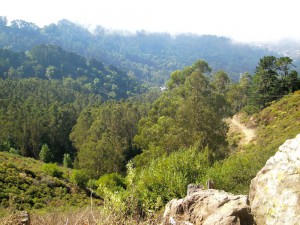My title for this Sunday’s sermon here in the Palo Alto church is “Liberal religion, Silicon Valley style.” I’m a big believer in the notion that any religious organization will be influenced by the immediately surrounding community. Therefore, Unitarian Universalism in Silicon Valley should have some distinctive features. So what are some of the most important of those distinctive features, and how do they affect the way we do religion here? Here are three possible answers:
(1) One distinctive feature of Silicon Valley life is the ethic of hard work: here in the Valley, people believe that the harder one works the better off one will be. By contrast, Thoreau’s famous book Walden, an important book for many Unitarian Universalists, extolls the virtue of spending less time working hard, and more time contemplating Nature. I’d say Silicon Valley liberal religion extolls the virtue of lots of hard work, and tends to ignore thinkers like Thoreau.
(2) Another distinctive feature of Silicon Valley life is that we live in a truly multicultural and multiracial place. Santa Clara County is a white-minority county with no dominant racial or ethnic group; this is what the rest of the United States will look like within a generation. And while our congregation is 85-90% white, that also means that we are 10-15% non-white, and we’re all so used to living in the multiracial, multicultural world of Silicon Valley that it seems to me we’re pretty relaxed about becoming an increasingly multicultural congregation.
(3) Now add another distinctive feature of Silicon Valley life: the engineering and entrepreneurial drive which lead us to believe we can fix anything if we put our minds to it. I think Silicon Valley is going to be the place where liberal religion figures out how to be truly multiracial and multicultural. Here in the Valley, multiracial doesn’t mean there are both black and white people in the congregation, it means there are whites, blacks, East Asians, and South Asians; and people who were born in several different countries (Russia, India, Taiwan, etc.).
So liberal religion in Silicon Valley is characterized by a strong work ethic; by multiculturalism; and by a can-do attitude. This raise the interesting question that I’m going to try to address in the sermon: Does this mean all we’re going to do in our congregation is work our asses off? Because if all we’re going to do is to work our asses off (or work our collective ass off, whatever), even if it’s for a good cause, I’m just not interested. There has to be a better way to do religion….

